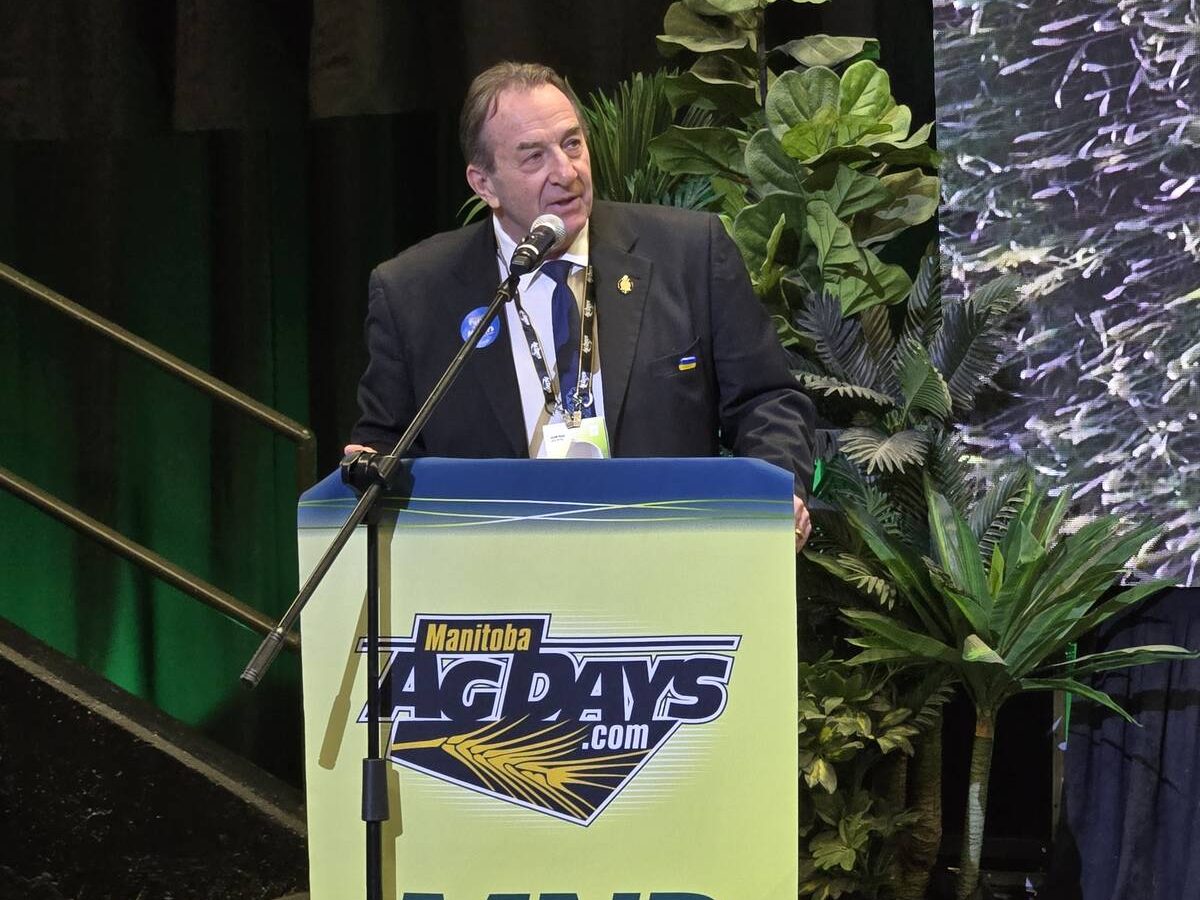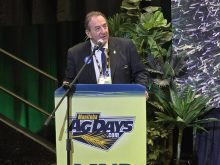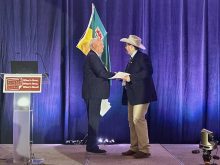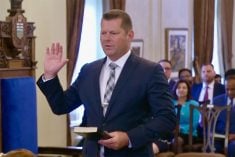What does it take to manage a large and growing, vertically integrated, multi-generation Prairie farm business alongside not one or two but seven adult family members? Passion, dedication, innovation and commitment to teamwork are just the start, says Alberta farmer, Lynne Hilton.
“I don’t have words to describe how exciting it is to have our children part of our farm. It’s something I try not to even speak about publicly because it’s so emotional – that tells you how exciting it is. It’s not just that they want to be part of carrying on what we care about, it’s exciting for the agriculture industry as a whole,” she says. “However, it takes effort, commitment and a lot of communication from all of us to keep us on track as a team.”
Read Also

Manitoba crop insurance expands wildlife coverage, offers pilot programs
New crop insurance coverage is available to Manitoba farmers.
Lynne Hilton and her husband, Spencer, together with sons, Dane and Reid, and brother- and sister-in-law Sterling and Lianna, operate a fifth-generation Alberta grain farm called Hilton Ventures. The farm includes 12,500 acres of cropland spread between Drumheller and Calgary. Alongside growing a diverse crop rotation and servicing multiple end-buyers, the farm supplies premium two-row malting barley to the farm business subsidiary, Origin Malting and Brewing Co., which is managed in part by daughter, Meleah, and son-in-law, Kyle Geeraert.
While operating a farm with extended family is a dream many farmers aspire to, multi-generational success isn’t as easy as simply welcoming one’s children home and then expecting parent-child dynamics to remain as they’ve always been. Instead, says Hilton, it’s critical that the younger generation be given space and opportunity to become their own kind of farmers.
“In agriculture, it’s common to hear farmers justifying techniques or attitudes because of tradition. But the ‘I do it that way because my dad did it that way and his dad did it that way,’ isn’t good for anyone, and it’s definitely not good for agriculture,” says Hilton. “It takes the newer generation to move agriculture forward.”
Forty years ago, Hilton was on the receiving end of that kind of freedom. In 1979, she and her husband moved onto his family’s homestead, joining his parents and, later, taking over the farm from them. Hilton’s father-in-law, Gordon, was a pioneer of no-till farming 40 years before sustainability became a buzzword in agriculture. Gordon was also progressive in his attitude toward the next generation, seeing them as true partners rather than grown-up kids. In fact, as soon as Hilton and her husband returned to the farm, her father-in-law allowed them free rein to try new technologies, improvise and take on responsibility.
Today, Hilton is pleased to offer the same to the next generation. While Dane, Reid and Meleah all left home in their late teens to pursue education and other careers, they’ve each chosen to return to the farm, bringing with them skills that are proving critical to today’s kind of farming.
“Thank goodness our kids don’t feel like they have to do it the way we did it. We encourage trial and error and the entrepreneurial spirit,” she says.
It’s important that everyone on the farm — the older generation too — feel room and support to grow the business in new and creative ways, she adds.
“We’re not stuck in a box like, maybe, agriculture was when we started. This business and this industry are whatever we dream them to be. There’s nothing stagnant about what we do — there’s new stuff and new possibilities coming down the pipe all the time.”
Communication takes practise and hard work
The single most critical component of making a multiplayer family farm work, says Hilton, is excellent communication. Every morning starts with clear communication between the Hilton Ventures management team. iPhone-based chat groups keep the operational discussions going throughout the day. For bigger-picture topics like major operational decisions, the family holds dedicated, scheduled, relatively formal, business meetings.
“We spend a lot of time talking about communication, learning about communication and relying on communication,” says Hilton. “In any operation, communication takes practise and hard work. In a family operation, you need to try even harder because those are relationships you really want to strengthen and have endure.”
Respect — intentional, consistent and practiced — is another priority.
“Everyone’s seat at the table is important. Everyone is allowed a voice and respected no matter how off the wall the idea. Everything we do is based on the awareness that we’re in this together,” she says.
Negotiating the family business dynamic also requires an active and ongoing decision to trust each other. Micromanagement simply doesn’t work, both because it’s inefficient and because it undermines the relationships critical to the family business success.
“We trust that everyone on the team is doing their best for Hilton Ventures,” Hilton says. “When we release a task to someone, the rest of us have to trust that person is going to do the task to the best of their ability, and we have to trust that person’s judgement.”
Luckily, that trust comes easily, since the family all shares a deep love for the land and business.
“There’s no fostering of passion for this business — we don’t have to work at being excited about what we do. That’s just there. You wake up and it’s there, you go to bed and it’s there. We wear it on our hearts every day,” she says.
Hilton Ventures’ vision of true success goes far beyond this season or next.
“Agriculture is a generational occupation,” says Hilton. “We’re blessed to know this farm didn’t stop with Spencer’s parents, it didn’t stop with us, it won’t stop with our kids. That’s a blessing you can’t take for granted and a responsibility, too. We’re expanding our land base and working to improve the health of our soil, all with an eye to the next generation. It’s a big window ahead of us. We want to pass on something that’s better and stronger because we were here.”















